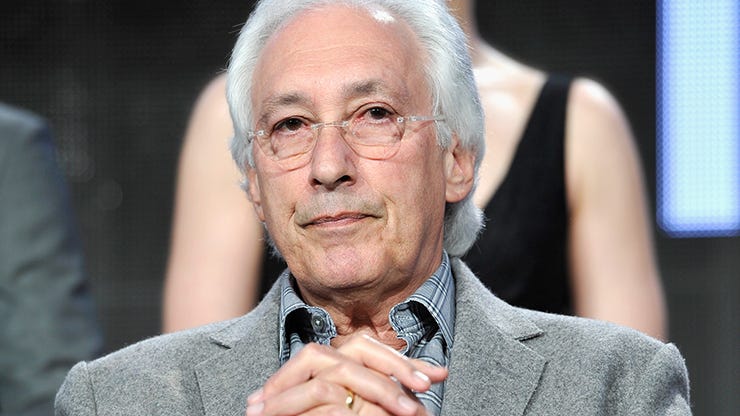Join or Sign In
Sign in to customize your TV listings
By joining TV Guide, you agree to our Terms of Use and acknowledge the data practices in our Privacy Policy.
Veteran Producer Steven Bochco Reveals Why Most Legal Dramas "Piss Him Off"
And how TV has come full circle
Steven Bochco never thought he'd write a memoir.
But that all changed when the veteran TV producer -- who created standout shows including Hill Street Blues, L.A. Law, NYPD Blueand Doogie Howser, M.D.-- had a heart attack in the summer of 2010, and was diagnosed with leukemia four years later.
"I was in the hospital, and I thought, 'Well, you know, if I come out of this alive... ,'" Bochco tells TVGuide.com. "It was something I really wanted to do for my kids. ... When my dad died, I realized that I really hadn't known much about him, in terms of sort of a coherent history of his life. I knew what he did, but I just didn't know him. ... And I thought, I want to leave a document for my kids and my grandkids, and then separately, anybody else who was interested."
L.A. Law creator Steven Bochco reveals why he said yes to a reboot
The result of Bochco's efforts is Truth Is a Total Defense: My Fifty Years in Television, which was released in August. The book chronicles Bochco's rise from a lowly script reader at Universal to one of the most prolific producers in television history. (Bochco's most recent project, Murder in the First, currently airs on TNT, and he's in the process of developing a reboot of L.A. Law.)
And while there are a few juicy tidbits sprinkled throughout -- Bochco discusses his colleague David Milch's gambling problem, the difficulties of working with NYPD Blue's original lead David Caruso, and the role Murder Onestar Daniel Benzali's bathroom habits played in the show's production schedule -- the book is mostly an insider's take on the changes that have taken place in the TV industry over the last 50-odd years.
Add new fall shows to your Watchlist now

From there, Bochco moved on to the independent production company MTM, run by Grant Tinker. "Grant Tinker in particular was such a great fan of writers that he really created an environment that empowered us," Bochco tells TVGuide.com. "The combination of time and circumstance and a certain amount of luck helped us launch Hill Street Blues, which created a real sea change in the way television was created and produced. Because Grant had empowered us writers to really run our shows. ... Suddenly, everything started to change for creators and showrunners. We were in charge of our stuff. And I think it really resulted in a second golden age of television."
But slowly, Bochco says, the industry started to return to its original form. "Vertical integration created these four or five behemoth organizations that basically controlled everything from top to bottom. They were the content providers, they were the distributors, they were the network," Bochco says. "And it sort of turned the business model upside down, where the executives and the networks and the so-called 'suits' were really running the show again. Writers and creators had none of the autonomy, or very little of the autonomy, that we had all enjoyed through the '80s and '90s."
In today's age of "Peak TV," Bochco says that even streaming platforms can't match the independent production companies that blossomed during television's first golden age. "As you go towards those alternative platforms, yeah, there is more freewheeling content and more freedom to do what you want to do," he notes. "On the other hand, the audience that you're accessing is significantly smaller."
Fall TV 2016: Get scoop on all the new shows
Bochco says he'd consider doing a show for Netflix, Amazon or other streaming platforms, but for now he's sticking with traditional TV. Though he cites L.A. Law as the only one of his "big shows" that he'd consider reviving, Bochco believes that some of his less successful efforts were ahead of their time. (And he's probably right.)
"Murder One, which was 20 years ago, I think could be very successful today," he says. "The way people watch TV today didn't exist 20 years ago. The idea of telling a single story over 22 episodes, over a full season of television - I don't think the American television audience was prepared to really embrace that. Today if you made that show, you could stockpile your episodes and watch four of them a night if you wanted to, and be done with it in a week."
As for what he's been watching recently, Bochco cites AMC's The Night Manager ("I liked that very much"), Netflix's Stranger Things ("really fun"), and HBO's The Night Of ("kind of interesting"). He names Breaking Bad his favorite show of the past five years. "Those are shows that are fun to stockpile, and you can watch those in less than a week," he says.
But more often than not, Bochco has trouble enjoying shows from a pure viewer's perspective, because he finds himself inadvertently dissecting the technical and creative aspects.
"It depends on the show. There are certain shows that I'm not good at watching for that very reason, because I tend to pick them apart," he admits. "I am not good at watching legal dramas, because most of them piss me off, because they take so many liberties with the reality of the legal system. To a lesser extent, I'm that way with cop shows. I'm not the best just pure fan. But if it's the kind of show that is not in my personal wheelhouse creatively, if it's not something that I think I would be all that good at, then I can just sort of relax and go with it."
Steven Bochco's Truth Is a Total Defense: My Fifty Years in Television is available now.
